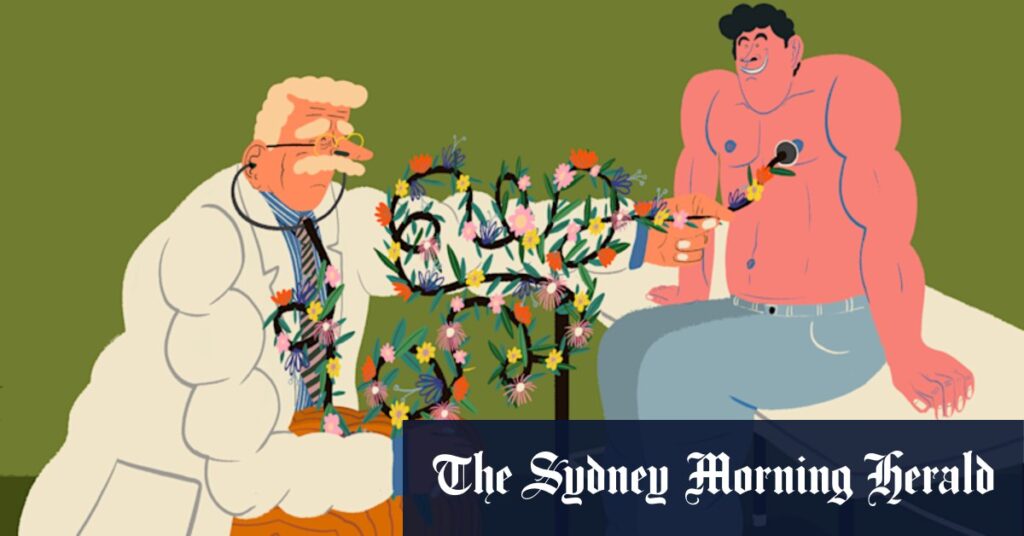Towards the end of summer each year, I wind up at the doctor’s office. It was a standing joke with my GP that each January he would tell me to wear earplugs when swimming, and I’d respond that I couldn’t hear him until after he’d applied a high-pressure surgical piston to blast out the accumulated gunk.
I swim a lot, which is a diplomatic way of saying that I enjoy wading into the crisp ocean and ducking my head under a few waves that are mostly waist-height. When you are lucky enough to grow up near the sea, you partake of this liberally. Dips before work. During lunch. At knock-off. There is nothing like the bracing freshness of a long-awaited plunge.
But the bones in my ears are not like yours. Since my early 20s they have been growing over, fusing into twisted tree roots that are perilously close to my brain. This is called external auditory canal exostoses and the net result is water gets trapped deep in my ears, calcifies into salty wax and renders me practically deaf.
My GP was diagnosed with an aggressive form of cancer early last year and passed away a painfully short time later, just as the ocean started warming up. I was bereft at the news of his death; he had been a friend of the family and a wonderfully selfless man. My father had also been a GP, and both their memorials were thronged with the grief of an extended community that had lost something vital to its very functioning. Doctors do not typically get state funerals but in their outpouring of mourners, their farewells can feel a bit like one. A former patient realises very quickly that they are but one of hundreds, all of whom maintain a distinctly personal relationship with someone who checks their bloods, listens to their chests and, on occasion, peers into their ears.
Those who serve our communities aren’t typically thought about in the same way as family members or friends. But they are crucial totems in our lives.
Once my doctor knew he was dying, his surgery arranged for my file to be transferred to another practice. A different GP would peruse my previous mental health plans and uncover my penicillin allergy. This should not have felt as strange as it did, like intimate details being passed on to a new lover. We tend to hold the view that certain members of society are with us for life; having them suddenly shut up shop, move towns or onto the next astral plane can be highly distressing.
Those who serve our communities, whether they treat our maladies, tailor our dresses or tame our tresses, aren’t typically thought about in the same way as family members or friends. But they are crucial totems in our lives, keepers of knowledge and secrets and an ongoing, living history to which few others have access. The level of trust placed in my hairdresser three days before my wedding is more than I ever expect from anyone at my bank.
I had the same barber between the ages of two and 32. A longtime patient of my father’s, Ignacio first ran a shop in a Kings Cross back lane full of heroin addicts; this improved only slightly when he relocated to a place up the road next door to a safe injecting room. It was a joint completely frozen in time, with a faded map of Italy on the wall and intense aftershave right out of the Hawke era. Infamous gangland personalities frequently dropped in for straight-razor shaves. As I grew older, I had every opportunity to find a more proximate, contemporary clipper-wielder. But I couldn’t leave Ignacio. He’d guided me through so many terrible hairstyle requests, even waxed my moustache pre-puberty. From the old Penthouse issues he left for those waiting for a haircut, I learnt how to write acerbic columns and what not to expect from sex.
Ignacio held out as Kings Cross lost its cosmopolitan flavour and slowly rebranded as Potts Point, but eventually the rent hikes got the better of him and he judiciously chose to retire. I mourned him in a similar fashion to my dearly departed doctor, another confidant lost amid the tides of time. Ignacio may not have cleared the water from my ears, but he filled them with plenty of knowledge – about how to be a decent man, earn a respectable living and look after your family. Eventually, I found someone else to cut my hair, but it was never quite the same.
The rise in working from home and online services means we’re less likely to interact as often with many of the familiar strangers woven into the fabric of our everyday lives. This may not seem like such a big deal, until you show up one day at a surgery or salon and they’re no longer there. The shock is startling, like diving into water far colder than anticipated. You did not imagine them as a friend, and yet the weight of their absence brings on that familiar pang. There will always be another, but there is no other like them.
I tell the new GP my ears are full of water. He chuckles. He’s heard it all before.
To read more from Good Weekend magazine, visit our page at The Sydney Morning Herald, The Age and Brisbane Times.
Read the full article here

